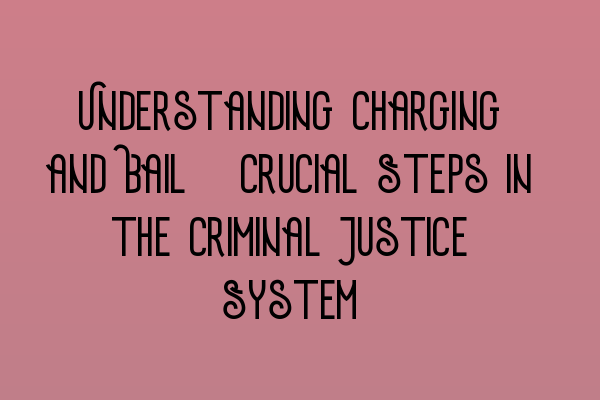Understanding Charging and Bail: Crucial Steps in the Criminal Justice System
In the criminal justice system, the process of charging and bail plays a pivotal role. These steps are crucial in determining the course of action for individuals accused of committing a crime. Whether you are a law student preparing for the SQE 1 exam or simply interested in learning about the criminal justice system, it is important to comprehend the significance of charging and bail. In this article, we will delve into the intricacies of these steps and shed light on their importance.
Charging: The First Step Towards Accountability
Charging is the initial step in the criminal justice system, where a person is formally accused of committing a crime. This process is handled by the police or prosecution based on the evidence gathered during an investigation. It is essential to understand that a charge does not imply guilt but rather establishes the legal basis for further action.
When someone is charged with a crime, it is crucial to seek legal representation. A skilled criminal solicitor can provide guidance and ensure that your rights are protected throughout the legal process. To ace the SQE 1 exam, it is essential to understand the various factors considered during charging, such as the evidence, witness statements, and legal principles surrounding the offense. Practicing SQE 1 mock exams can help you apply your knowledge effectively.
Bail: Preserving Individual Rights and Public Safety
After being charged with a crime, an individual may be held in custody or granted bail. Bail is a legal process that allows an accused person to be released from custody while awaiting trial. This step is particularly significant as it upholds the principle of innocent until proven guilty and ensures the preservation of individual rights.
During the SQE 2 exam, it is important to have a comprehensive understanding of the bail process. This includes knowledge of the factors considered when granting bail, such as the seriousness of the offense, the likelihood of reoffending, and the potential risk to public safety. SQE 2 preparation courses can equip you with the necessary knowledge and skills to excel in this area.
It is worth noting that in some cases, bail may be denied. This typically occurs when there is a substantial risk of flight, interference with witnesses, or a potential threat to public safety. Understanding the complexities of bail can be essential in making informed decisions when representing clients or answering questions related to bail in the SQE 1 exam.
Preparing for the SQE Exams: Resources for Success
To excel in the SQE exams, it is crucial to have access to comprehensive study materials and resources. The following resources can be immensely helpful in your preparation:
– SQE 1 Practice Exam Questions: These practice questions provide insight into the types of questions you may encounter in the SQE 1 exam. Familiarizing yourself with different scenarios and legal principles can significantly enhance your performance.
– SQE 1 Practice Mocks FLK1 FLK2: Practice mocks offer a simulated exam experience, allowing you to gauge your preparation level and identify areas for improvement. These mock exams provide invaluable practice and help you become familiar with the format and timing of the actual exam.
– SQE 2 Preparation Courses: SQE 2 preparation courses are designed to equip you with the necessary knowledge and skills required to succeed in the exam. These courses cover various aspects of criminal law and practice, ensuring that you are well-prepared for the challenges ahead.
– SQE 1 Preparation Courses: SQE 1 preparation courses are specifically tailored to help you prepare for the first stage of the SQE exam. These courses cover topics such as criminal law, contract law, and professional conduct, enabling you to develop a solid foundation of knowledge.
– SRA SQE Exam Dates: Stay updated with the latest SRA SQE exam dates to plan your preparation effectively. Being aware of the exam timeline allows you to allocate sufficient time for studying, revision, and practice.
Final Thoughts
Understanding the charging and bail processes is fundamental to comprehending the criminal justice system. Whether you are a solicitor representing clients or a law student preparing for the SQE exams, a thorough understanding of these processes is crucial. By utilizing resources such as SQE 1 practice exam questions, practice mocks, and SQE preparation courses, you can enhance your knowledge and perform exceptionally in the exams. Stay informed about the SRA SQE exam dates to create a study plan that maximizes your chances of success. Remember, a strong foundation in criminal law and practice is essential for a successful legal career.
